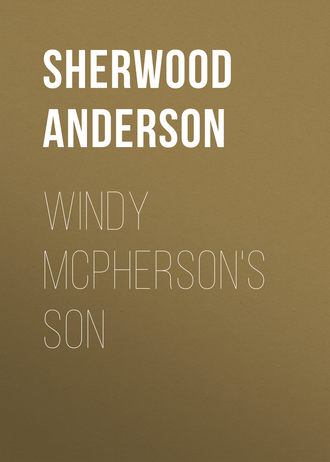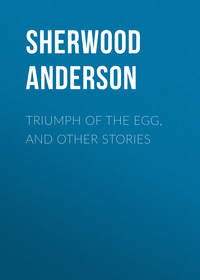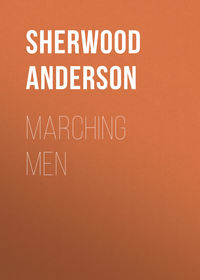 полная версия
полная версияWindy McPherson's Son
Now, even from where he sat, he could see that his father was half gone in drink, and knew that he was boasting of his part in the Civil War. “He is either doing that or telling of his aristocratic family or lying about his birthplace,” he thought resentfully, and unable any longer to endure the sight of what seemed to him his own degradation, he got up and went into the grocery where a group of Caxton citizens stood talking to Wildman of a meeting to be held that morning at the town hall.
Caxton was to have a Fourth of July celebration. The idea, born in the heads of the few, had been taken up by the many. Rumours of it had run through the streets late in May. It had been talked of in Geiger’s drug store, at the back of Wildman’s grocery, and in the street before the New Leland House. John Telfer, the town’s one man of leisure, had for weeks been going from place to place discussing the details with prominent men. Now a mass meeting was to be held in the hall over Geiger’s drug store and to a man the citizens of Caxton had turned out for the meeting. The housepainter had come down off his ladder, the clerks were locking the doors of the stores, men went along the streets in groups bound for the hall. As they went they shouted to each other. “The old town has woke up,” they called.
On a corner by Hunter’s jewelry store Windy McPherson leaned against a building and harangued the passing crowd.
“Let the old flag wave,” he shouted excitedly, “let the men of Caxton show the true blue and rally to the old standards.”
“That’s right, Windy, expostulate with them,” shouted a wit, and a roar of laughter drowned Windy’s reply.
Sam McPherson also went to the meeting in the hall. He came out of the grocery store with Wildman and went along the street looking at the sidewalk and trying not to see the drunken man talking in front of the jewelry store. At the hall other boys stood in the stairway or ran up and down the sidewalk talking excitedly, but Sam was a figure in the town’s life and his right to push in among the men was not questioned. He squirmed through the mass of legs and secured a seat in a window ledge where he could watch the men come in and find seats.
As Caxton’s one newsboy Sam had got from his newspaper selling both a living and a kind of standing in the town’s life. To be a newsboy or a bootblack in a small novel-reading American town is to make a figure in the world. Do not all of the poor newsboys in the books become great men and is not this boy who goes among us so industriously day after day likely to become such a figure? Is it not a duty we of the town owe to future greatness that we push him forward? So reasoned the men of Caxton and paid a kind of court to the boy who sat on the window ledge of the hall while the other boys of the town waited on the sidewalk below.
John Telfer was chairman of the mass meeting. He was always chairman of public meetings in Caxton. The industrious silent men of position in the town envied his easy, bantering style of public address, while pretending to treat it with scorn. “He talks too much,” they said, making a virtue of their own inability with apt and clever words.
Telfer did not wait to be appointed chairman of the meeting, but went forward, climbed the little raised platform at the end of the hall, and usurped the chairmanship. He walked up and down on the platform bantering with the crowd, answering gibes, calling to well-known men, getting and giving keen satisfaction with his talent. When the hall was filled with men he called the meeting to order, appointed committees and launched into a harangue. He told of plans made to advertise the big day in other towns and to get low railroad rates arranged for excursion parties. The programme, he said, included a musical carnival with brass bands from other towns, a sham battle by the military company at the fairgrounds, horse races, speeches from the steps of the town hall, and fireworks in the evening. “We’ll show them a live town here,” he declared, walking up and down the platform and swinging his cane, while the crowd applauded and shouted its approval.
When a call came for voluntary subscriptions to pay for the fun, the audience quieted down. One or two men got up and started to go out, grumbling that it was a waste of money. The fate of the celebration was on the knees of the gods.
Telfer arose to the occasion. He called out the names of the departing, and made jests at their expense so that they dropped back into their chairs unable to face the roaring laughter of the crowd, and shouted to a man at the back of the hall to close and bolt the door. Men began getting up in various parts of the hall and calling out sums, Telfer repeating the name and the amount in a loud voice to young Tom Jedrow, clerk in the bank, who wrote them down in a book. When the amount subscribed did not meet with his approval, he protested and the crowd backing him up forced the increase he demanded. When a man did not rise, he shouted at him and the man answered back an amount.
Suddenly in the hall a diversion arose. Windy McPherson emerged from the crowd at the back of the hall and walked down the centre aisle to the platform. He walked unsteadily straightening his shoulders and thrusting out his chin. When he got to the front of the hall he took a roll of bills from his pocket and threw it on the platform at the chairman’s feet. “From one of the boys of ‘61,” he announced in a loud voice.
The crowd shouted and clapped its hands with delight as Telfer picked up the bills and ran his finger over them. “Seventeen dollars from our hero, the mighty McPherson,” he shouted while the bank clerk wrote the name and the amount in the book and the crowd continued to make merry over the title given the drunken soldier by the chairman.
The boy on the window ledge slipped to the floor and stood with burning cheeks behind the mass of men. He knew that at home his mother was doing a family washing for Lesley, the shoe merchant, who had given five dollars to the Fourth-of-July fund, and the resentment he had felt on seeing his father talking to the crowd before the jewelry store blazed up anew.
After the taking of subscriptions, men in various parts of the hall began making suggestions for added features for the great day. To some of the speakers the crowd listened respectfully, at others they hooted. An old man with a grey beard told a long rambling story of a Fourth-of-July celebration of his boyhood. When voices interrupted he protested and shook his fist in the air, pale with indignation.
“Oh, sit down, old daddy,” shouted Freedom Smith and a murmur of applause greeted this sensible suggestion.
Another man got up and began to talk. He had an idea. “We will have,” he said, “a bugler mounted on a white horse who will ride through the town at dawn blowing the reveille. At midnight he will stand on the steps of the town hall and blow taps to end the day.”
The crowd applauded. The idea had caught their fancy and had instantly taken a place in their minds as one of the real events of the day.
Again Windy McPherson emerged from the crowd at the back of the hall. Raising his hand for silence he told the crowd that he was a bugler, that he had been a regimental bugler for two years during the Civil War. He said that he would gladly volunteer for the place.
The crowd shouted and John Telfer waved his hand. “The white horse for you, McPherson,” he said.
Sam McPherson wriggled along the wall and out at the now unbolted door. He was filled with astonishment at his father’s folly, and was still more astonished at the folly of these other men in accepting his statement and handing over the important place for the big day. He knew that his father must have had some part in the war as he was a member of the G. A. R., but he had no faith at all in the stories he had heard him relate of his experiences in the war. Sometimes he caught himself wondering if there ever had been such a war and thought that it must be a lie like everything else in the life of Windy McPherson. For years he had wondered why some sensible solid person like Valmore or Wildman did not rise, and in a matter-of-fact way tell the world that no such thing as the Civil War had ever been fought, that it was merely a figment in the minds of pompous old men demanding unearned glory of their fellows. Now hurrying along the street with burning cheeks, he decided that after all there must have been such a war. He had had the same feeling about birthplaces and there could be no doubt that people were born. He had heard his father claim as his birthplace Kentucky, Texas, North Carolina, Louisiana and Scotland. The thing had left a kind of defect in his mind. To the end of his life when he heard a man tell the place of his birth he looked up suspiciously, and a shadow of doubt crossed his mind.
From the mass meeting Sam went home to his mother and presented the case bluntly. “The thing will have to be stopped,” he declared, standing with blazing eyes before her washtub. “It is too public. He can’t blow a bugle; I know he can’t. The whole town will have another laugh at our expense.”
Jane McPherson listened in silence to the boy’s outburst, then, turning, went back to rubbing clothes, avoiding his eyes.
With his hands thrust into his trousers pocket Sam stared sullenly at the ground. A sense of justice told him not to press the matter, but as he walked away from the washtub and out at the kitchen door, he hoped there would be plain talk of the matter at supper time. “The old fool!” he protested, addressing the empty street. “He is going to make a show of himself again.”
When Windy McPherson came home that evening, something in the eyes of the silent wife, and the sullen face of the boy, startled him. He passed over lightly his wife’s silence but looked closely at his son. He felt that he faced a crisis. In the emergency he was magnificent. With a flourish, he told of the mass meeting, and declared that the citizens of Caxton had arisen as one man to demand that he take the responsible place as official bugler. Then, turning, he glared across the table at his son.
Sam, openly defiant, announced that he did not believe his father capable of blowing a bugle.
Windy roared with amazement. He rose from the table declaring in a loud voice that the boy had wronged him; he swore that he had been for two years bugler on the staff of a colonel, and launched into a long story of a surprise by the enemy while his regiment lay asleep in their tents, and of his standing in the face of a storm of bullets and blowing his comrades to action. Putting one hand on his forehead he rocked back and forth as though about to fall, declaring that he was striving to keep back the tears wrenched from him by the injustice of his son’s insinuation and, shouting so that his voice carried far down the street, he declared with an oath that the town of Caxton should ring and echo with his bugling as the sleeping camp had echoed with it that night in the Virginia wood. Then dropping again into his chair, and resting his head upon his hand, he assumed a look of patient resignation.
Windy McPherson was victorious. In the little house a great stir and bustle of preparation arose. Putting on his white overalls and forgetting for the time his honourable wounds the father went day after day to his work as a housepainter. He dreamed of a new blue uniform for the great day and in the end achieved the realisation of his dreams, not however without material assistance from what was known in the house as “Mother’s Wash Money.” And the boy, convinced by the story of the midnight attack in the woods of Virginia, began against his judgment to build once more an old dream of his father’s reformation. Boylike, the scepticism was thrown to the winds and he entered with zeal into the plans for the great day. As he went through the quiet residence streets delivering the late evening papers, he threw back his head and revelled in the thought of a tall blue-clad figure on a great white horse passing like a knight before the gaping people. In a fervent moment he even drew money from his carefully built-up bank account and sent it to a firm in Chicago to pay for a shining new bugle that would complete the picture he had in his mind. And when the evening papers were distributed he hurried home to sit on the porch before the house discussing with his sister Kate the honours that had alighted upon their family.
With the coming of dawn on the great day the three McPhersons hurried hand in hand toward Main Street. In the street, on all sides of them, they saw people coming out of houses rubbing their eyes and buttoning their coats as they went along the sidewalk. All of Caxton seemed abroad.
In Main Street the people were packed on the sidewalk, and massed on the curb and in the doorways of the stores. Heads appeared at windows, flags waved from roofs or hung from ropes stretched across the street, and a great murmur of voices broke the silence of the dawn.
Sam’s heart beat so that he was hard put to it to keep back the tears from his eyes. He thought with a gasp of the days of anxiety that had passed when the new bugle had not come from the Chicago company, and in retrospect he suffered again the horror of the days of waiting. It had been all important. He could not blame his father for raving and shouting about the house, he himself had felt like raving, and had put another dollar of his savings into telegrams before the treasure was finally in his hands. Now, the thought that it might not have come sickened him, and a little prayer of thankfulness rose from his lips. To be sure one might have been secured from a nearby town, but not a new shining one to go with his father’s new blue uniform.
A cheer broke from the crowd massed along the street. Into the street rode a tall figure seated upon a white horse. The horse was from Culvert’s livery and the boys there had woven ribbons into its mane and tail. Windy McPherson, sitting very straight in the saddle and looking wonderfully striking in the new blue uniform and the broad-brimmed campaign hat, had the air of a conqueror come to receive the homage of the town. He wore a gold band across his chest and against his hip rested the shining bugle. With stern eyes he looked down upon the people.
The lump in the throat of the boy hurt more and more. A great wave of pride ran over him, submerging him. In a moment he forgot all the past humiliations the father had brought upon his family, and understood why his mother remained silent when he, in his blindness, had wanted to protest against her seeming indifference. Glancing furtively up he saw a tear lying upon her cheek and felt that he too would like to sob aloud his pride and happiness.
Slowly and with stately stride the horse walked up the street between the rows of silent waiting people. In front of the town hall the tall military figure, rising in the saddle, took one haughty look at the multitude, and then, putting the bugle to his lips, blew.
Out of the bugle came only a thin piercing shriek followed by a squawk. Again Windy put the bugle to his lips and again the same dismal squawk was his only reward. On his face was a look of helpless boyish astonishment.
And in a moment the people knew. It was only another of Windy McPherson’s pretensions. He couldn’t blow a bugle at all.
A great shout of laughter rolled down the street. Men and women sat on the curbstones and laughed until they were tired. Then, looking at the figure upon the motionless horse, they laughed again.
Windy looked about him with troubled eyes. It is doubtful if he had ever had a bugle to his lips until that moment, but he was filled with wonder and astonishment that the reveille did not roll forth. He had heard the thing a thousand times and had it clearly in his mind; with all his heart he wanted it to roll forth, and could picture the street ringing with it and the applause of the people; the thing, he felt, was in him, and it was only a fatal blunder in nature that it did not come out at the flaring end of the bugle. He was amazed at this dismal end of his great moment—he was always amazed and helpless before facts.
The crowd began gathering about the motionless, astonished figure, laughter continuing to send them off into something near convulsions. Grasping the bridle of the horse, John Telfer began leading it off up the street. Boys whooped and shouted at the rider, “Blow! Blow!”
The three McPhersons stood in a doorway leading into a shoe store. The boy and the mother, white and speechless with humiliation, dared not look at each other. In the flood of shame sweeping over them they stared straight before them with hard, stony eyes.
The procession led by John Telfer at the bridle of the white horse marched down the street. Looking up, the eyes of the laughing, shouting man met those of the boy and a look of pain shot across his face. Dropping the bridle he hurried away through the crowd. The procession moved on, and watching their chance the mother and the two children crept home along side streets, Kate weeping bitterly. Leaving them at the door Sam went straight on down a sandy road toward a small wood. “I’ve got my lesson. I’ve got my lesson,” he muttered over and over as he went.
At the edge of the wood he stopped and leaning on a rail fence watched until he saw his mother come out to the pump in the back yard. She had begun to draw water for the day’s washing. For her also the holiday was at an end. A flood of tears ran down the boy’s cheeks, and he shook his fist in the direction of the town. “You may laugh at that fool Windy, but you shall never laugh at Sam McPherson,” he cried, his voice shaking with excitement.
CHAPTER III
One evening, when he had grown so that he outtopped Windy, Sam McPherson returned from his paper route to find his mother arrayed in her black, church-going dress. An evangelist was at work in Caxton and she had decided to hear him. Sam shuddered. In the house it was an understood thing that when Jane McPherson went to church her son went with her. There was nothing said. Jane McPherson did all things without words, always there was nothing said. Now she stood waiting in her black dress when her son came in at the door and he hurriedly put on his best clothes and went with her to the brick church.
Valmore, John Telfer, and Freedom Smith, who had taken upon themselves a kind of common guardianship of the boy and with whom he spent evening after evening at the back of Wildman’s grocery, did not go to church. They talked of religion and seemed singularly curious and interested in what other men thought on the subject but they did not allow themselves to be coaxed into a house of worship. To the boy, who had become a fourth member of the evening gatherings at the back of the grocery store, they would not talk of God, answering the direct questions he sometimes asked by changing the subject. Once Telfer, the reader of poetry, answered the boy. “Sell papers and fill your pockets with money but let your soul sleep,” he said sharply.
In the absence of the others Wildman talked more freely. He was a spiritualist and tried to make Sam see the beauties of that faith. On long summer afternoons the grocer and the boy spent hours driving through the streets in a rattling old delivery wagon, the man striving earnestly to make clear to the boy the shadowy ideas of God that were in his mind.
Although Windy McPherson had been the leader of a Bible class in his youth, and had been a moving spirit at revival meetings during his early days in Caxton, he no longer went to church and his wife did not ask him to go. On Sunday mornings he lay abed. If there was work to be done about the house or yard he complained of his wounds. He complained of his wounds when the rent fell due, and when there was a shortage of food in the house. Later in his life and after the death of Jane McPherson the old soldier married the widow of a farmer by whom he had four children and with whom he went to church twice on Sunday. Kate wrote Sam one of her infrequent letters about it. “He has met his match,” she said, and was tremendously pleased.
In church on Sunday mornings Sam went regularly to sleep, putting his head on his mother’s arm and sleeping throughout the service. Jane McPherson loved to have the boy there beside her. It was the one thing in life they did together and she did not mind his sleeping the time away. Knowing how late he had been upon the streets at the paper selling on Saturday evenings, she looked at him with eyes filled with tenderness and sympathy. Once the minister, a man with brown beard and hard, tightly-closed mouth, spoke to her. “Can’t you keep him awake?” he asked impatiently. “He needs the sleep,” she said and hurried past the minister and out of the church, looking ahead of her and frowning.
The evening of the evangelist meeting was a summer evening fallen on a winter month. All day the warm winds had come up from the southwest. Mud lay soft and deep in the streets and among the little pools of water on the sidewalks were dry spots from which steam arose. Nature had forgotten herself. A day that should have sent old fellows to their nests behind stoves in stores sent them forth to loaf in the sun. The night fell warm and cloudy. A thunder storm threatened in the month of February.
Sam walked along the sidewalk with his mother bound for the brick church, wearing a new grey overcoat. The night did not demand the overcoat but Sam wore it out of an excess of pride in its possession. The overcoat had an air. It had been made by Gunther the tailor after a design sketched on the back of a piece of wrapping paper by John Telfer and had been paid for out of the newsboy’s savings. The little German tailor, after a talk with Valmore and Telfer, had made it at a marvellously low price. Sam swaggered as he walked.
He did not sleep in church that evening; indeed he found the quiet church filled with a medley of strange noises. Folding carefully the new coat and laying it beside him on the seat he looked with interest at the people, feeling within him something of the nervous excitement with which the air was charged. The evangelist, a short, athletic-looking man in a grey business suit, seemed to the boy out of place in the church. He had the assured business-like air of the travelling men who come to the New Leland House, and Sam thought he looked like a man who had goods to be sold. He did not stand quietly back of the pulpit giving out the text as did the brown-bearded minister, nor did he sit with closed eyes and clasped hands waiting for the choir to finish singing. While the choir sang he ran up and down the platform waving his arms and shouting excitedly to the people on the church benches, “Sing! Sing! Sing! For the glory of God, sing!”
When the song was finished, he began talking, quietly at first, of life in the town. As he talked he grew more and more excited. “The town is a cesspool of vice!” he shouted. “It reeks with evil! The devil counts it a suburb of hell!”
His voice rose, and sweat ran off his face. A sort of frenzy seized him. He pulled off his coat and throwing it over a chair ran up and down the platform and into the aisles among the people, shouting, threatening, pleading. People began to stir uneasily in their seats. Jane McPherson stared stonily at the back of the woman in front of her. Sam was horribly frightened.
The newsboy of Caxton was not without a hunger for religion. Like all boys he thought much and often of death. In the night he sometimes awakened cold with fear, thinking that death must be just without the door of his room waiting for him. When in the winter he had a cold and coughed, he trembled at the thought of tuberculosis. Once, when he was taken with a fever, he fell asleep and dreamed that he had died and was walking on the trunk of a fallen tree over a ravine filled with lost souls that shrieked with terror. When he awoke he prayed. Had some one come into his room and heard his prayer he would have been ashamed.
On winter evenings as he walked through the dark streets with the papers under his arm he thought of his soul. As he thought a tenderness came over him; a lump came into his throat and he pitied himself; he felt that there was something missing in his life, something he wanted very badly.
Under John Telfer’s influence, the boy, who had quit school to devote himself to money making, read Walt Whitman and had a season of admiring his own body with its straight white legs, and the head that was poised so jauntily on the body. Sometimes he would awaken on summer nights and be so filled with strange longing that he would creep out of bed and, pushing open the window, sit upon the floor, his bare legs sticking out beyond his white nightgown, and, thus sitting, yearn eagerly toward some fine impulse, some call, some sense of bigness and of leadership that was absent from the necessities of the life he led. He looked at the stars and listened to the night noises, so filled with longing that the tears sprang to his eyes.






